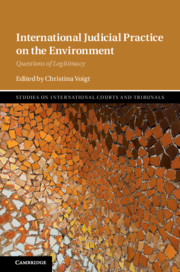Book contents
- Reviews
- International Judicial Practice on the Environment
- Studies on International Courts and Tribunals
- International Judicial Practice on the Environment
- Copyright page
- Contents
- Contributors
- Acknowledgements
- Table of Cases
- Introduction International Courts and the Environment: the Quest for Legitimacy
- Part I Procedural Legitimacy of Judicial Environmental Practice: Access to Justice
- Part II Legitimacy and Scientific Certainty: Environmental Adjudication, Use of Experts and the Limits of Science
- Part III Judges as Law-Makers: Legitimate Development of Environmental Law
- Part IV Legitimacy of Outcomes: Performance, Effects (and Side-Effects)
- Part V The Legitimacy of Non-Compliance Procedures
- Part VI The Limits of Environmental Justice through Courts: Balancing Legitimacy with the Need for Creativity
- 15 Environmental Ombudsman: Its Role in the System of Accountability Mechanisms for Administrative Environmental Decision Making
- 16 The Role of NGOs in Monitoring Compliance under the World Heritage Convention: Options for an Improved Tripartite Regime
- 17 Beyond Litigation: the Need for Creativity in Working to Realise Environmental Rights
- Index
16 - The Role of NGOs in Monitoring Compliance under the World Heritage Convention: Options for an Improved Tripartite Regime
from Part VI - The Limits of Environmental Justice through Courts: Balancing Legitimacy with the Need for Creativity
Published online by Cambridge University Press: 15 April 2019
- Reviews
- International Judicial Practice on the Environment
- Studies on International Courts and Tribunals
- International Judicial Practice on the Environment
- Copyright page
- Contents
- Contributors
- Acknowledgements
- Table of Cases
- Introduction International Courts and the Environment: the Quest for Legitimacy
- Part I Procedural Legitimacy of Judicial Environmental Practice: Access to Justice
- Part II Legitimacy and Scientific Certainty: Environmental Adjudication, Use of Experts and the Limits of Science
- Part III Judges as Law-Makers: Legitimate Development of Environmental Law
- Part IV Legitimacy of Outcomes: Performance, Effects (and Side-Effects)
- Part V The Legitimacy of Non-Compliance Procedures
- Part VI The Limits of Environmental Justice through Courts: Balancing Legitimacy with the Need for Creativity
- 15 Environmental Ombudsman: Its Role in the System of Accountability Mechanisms for Administrative Environmental Decision Making
- 16 The Role of NGOs in Monitoring Compliance under the World Heritage Convention: Options for an Improved Tripartite Regime
- 17 Beyond Litigation: the Need for Creativity in Working to Realise Environmental Rights
- Index
Summary
This chapter explores the role of non-State actors under the 1972 World Heritage Convention (WHC). Non-State actors, such as non-government organisations (NGOs), can play a powerful role in monitoring the activities of States under international environmental law. A treaty such as the WHC, with few non-compliance procedures, is strengthened by the presence of NGOs, though their legitimacy to regulate is debatable. The author gives an overview of the world heritage system, focusing on non-compliance mechanisms. The chapter gives examples of NGOs using petitioning as a tool to monitor State behaviour and bringing it before the World Heritage Committee. Under international law petitioning is legally questionable, but it appears that NGOs have resorted to it to raise the profile of potential risks to world heritage sites. Their actions seem to be born out of not choice but frustration, and so an argument is developed for more formalised lines of involvement for NGOs under the WHC. The chapter is relevant for those interested in the protection of world heritage and how softer forms of non-State regulation can promote compliance with international environmental law.
- Type
- Chapter
- Information
- International Judicial Practice on the EnvironmentQuestions of Legitimacy, pp. 417 - 442Publisher: Cambridge University PressPrint publication year: 2019



